Refrigerator Kosher Dill Pickles – Claussen Copycat Recipe
Delicious, crispy Refrigerator Kosher Dill Pickles without the canning process! If you’re a dill pickle fan but not enthusiastic about canning, you’ll love my copycat recipe of the famous Claussen brand of dill pickles found in your grocery store’s refrigerator case.
For lots of us, canning season is at its height about now. Everyone’s putting up luscious fruits and tasty veggies to enjoy throughout the year.
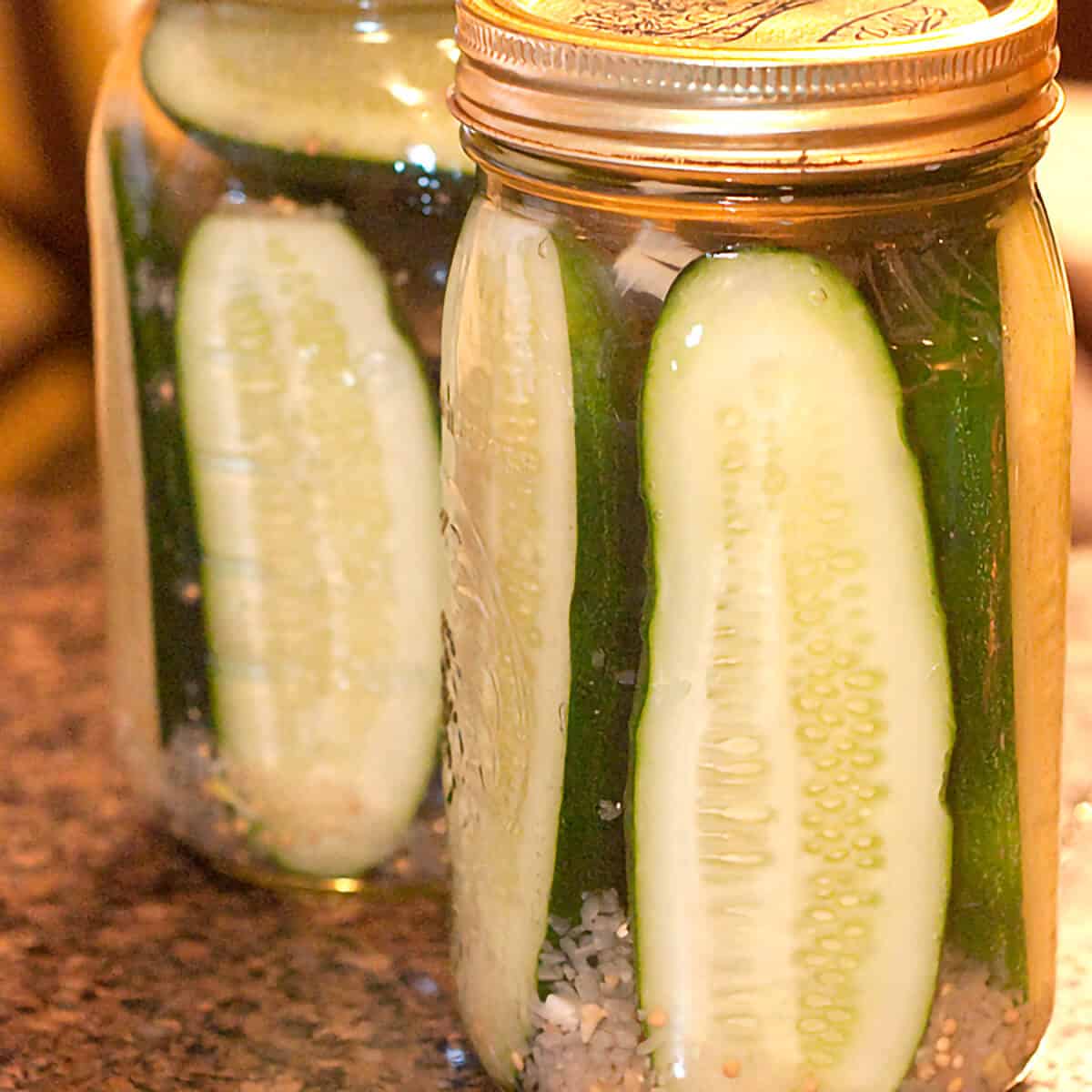
One of our family’s favorites and the recipe I do without fail every year is kosher dill pickles. I’ve only done a few quarts so far this year and really should get busy doing some more.
I’ve done a few Quick Pickled Jalapenos and some bread and butter pickles but no jams or preserves yet. Need to get those done while peaches are still at their peak. And maybe make some Okra Chips as well. Can you tell that preserving and canning is something I really enjoy?
But what if you don’t have all the canning equipment or just don’t enjoy doing all that work? Well then, maybe refrigerator pickles would be more your style.
These refrigerator kosher dill pickles are a copycat of the Claussen brand you find in the refrigerator section at your grocery store. They’re really, really easy to do and have a great crunch and flavor. I’d love for you to give these a try and let me know how you like them!
❤️ Why You’ll Love This Recipe
- No boiling water bath required.
- No special canning equipment needed.
- Very easy! You don’t need to be a “canning person” to make these.
- They’re crunchier than canned pickles and taste very much like the name brand.
🛒 Ingredient Notes
This post contains affiliate links. Lana’s Cooking is reader-supported and earns a tiny commission at no extra cost to you when you shop from our links.
- Pickling cucumbers – also known as “kirby” cucumbers or sometimes “salad” cucumbers; be sure not to purchase the regular waxed cucumbers for this.
- Apple cider vinegar
- Dried minced onion – you’ll find this in the spice aisle at your grocery store.
- Fresh garlic
- Yellow mustard seed – also in your grocery store’s spice section.
- Canning salt – we use canning salt because it’s completely pure salt and will keep the pickle brine nice and clear.
- Fresh dill heads or dried dill seed – find fresh dill in your grocery store’s produce section or dried dill seed with the spices.
You’ll find detailed measurements for all ingredients in the printable version of the recipe at the bottom of this post.
🥄 How to Make Refrigerator Kosher Dill Pickles
One word of warning about this recipe – if possible, open the windows before you start boiling the solution. It gives off a really strong onion odor. And don’t make this the day before you’re having company over because your house will still smell like it the day after :-)
👉 PRO TIP: If you happen to have fresh dill in your garden or from your grocery store, you can use the heads in this recipe. Otherwise, dried dill seed works just as well. If you use the fresh dill, pack it in the jars with the cucumbers. If using dill seed, put them in with the vinegar solution.
Make the Brine
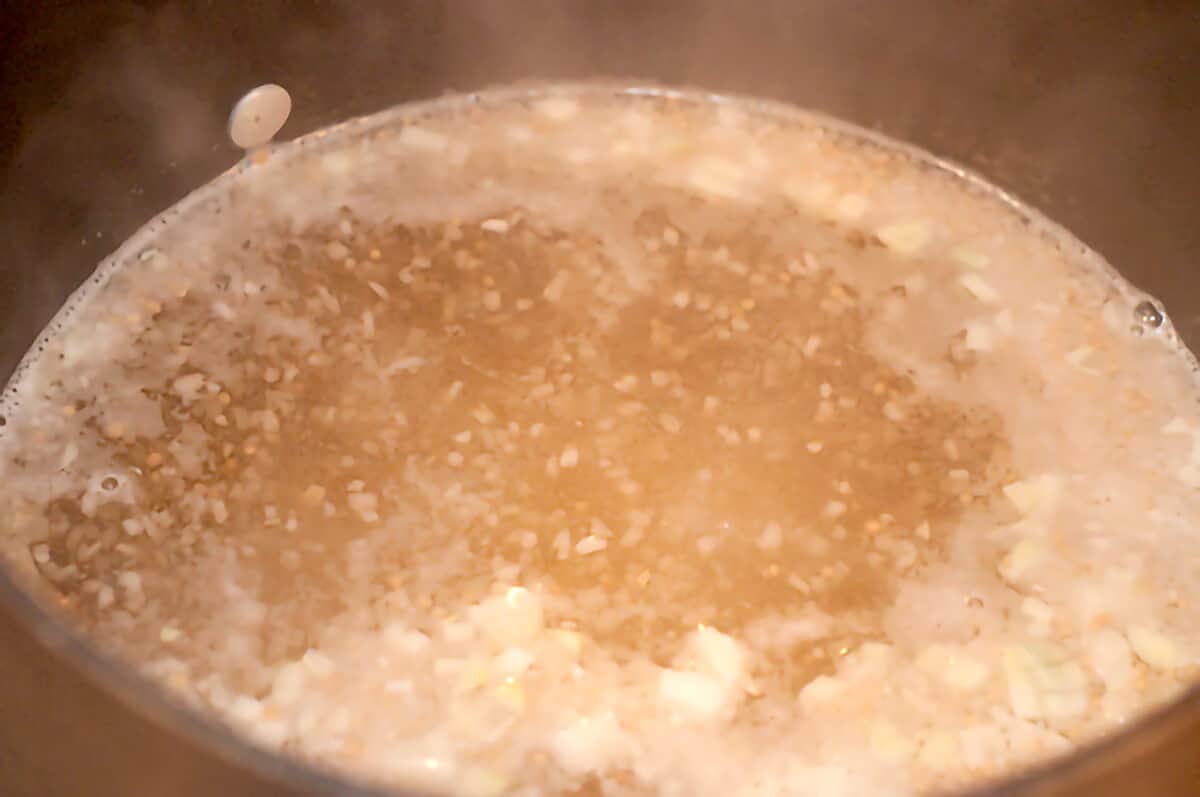
In a large saucepan, bring the water, vinegar, onion, garlic, mustard seed, canning salt and dill seed (if using) to a rapid boil. Cook until the salt has completely dissolved. Set the mixture aside and allow it to cool to room temperature.
Prepare the Jars
Prepare six wide-mouth quart canning jars and lids. Wash the jars, lids, and rings thoroughly in hot, soapy water. Rinse well. Keep the lids warm in barely simmering water.
To sterilize the jars, place them in a large pot filled with enough water to cover. Bring to a boil. Boil 10 minutes. Remove the jars from the water using a canning jar lifter and place them upside down on a kitchen towel to cool.
Prep the Cucumbers
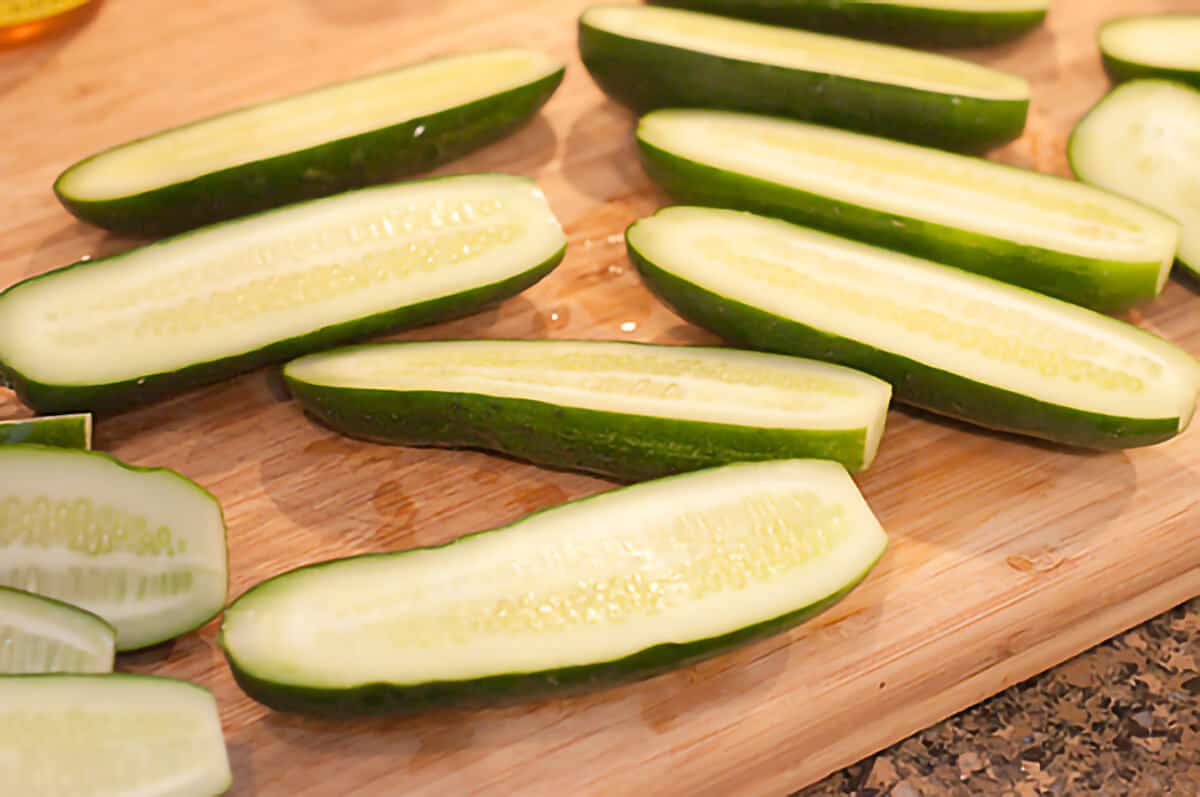
Prepare the cucumbers by washing in cool water being careful to remove any dirt that may cling to the skin. Remove a 1/16” slice from the blossom end of each cucumber. Slice the cucumbers lengthwise into halves or quarters.
Fill the Jars
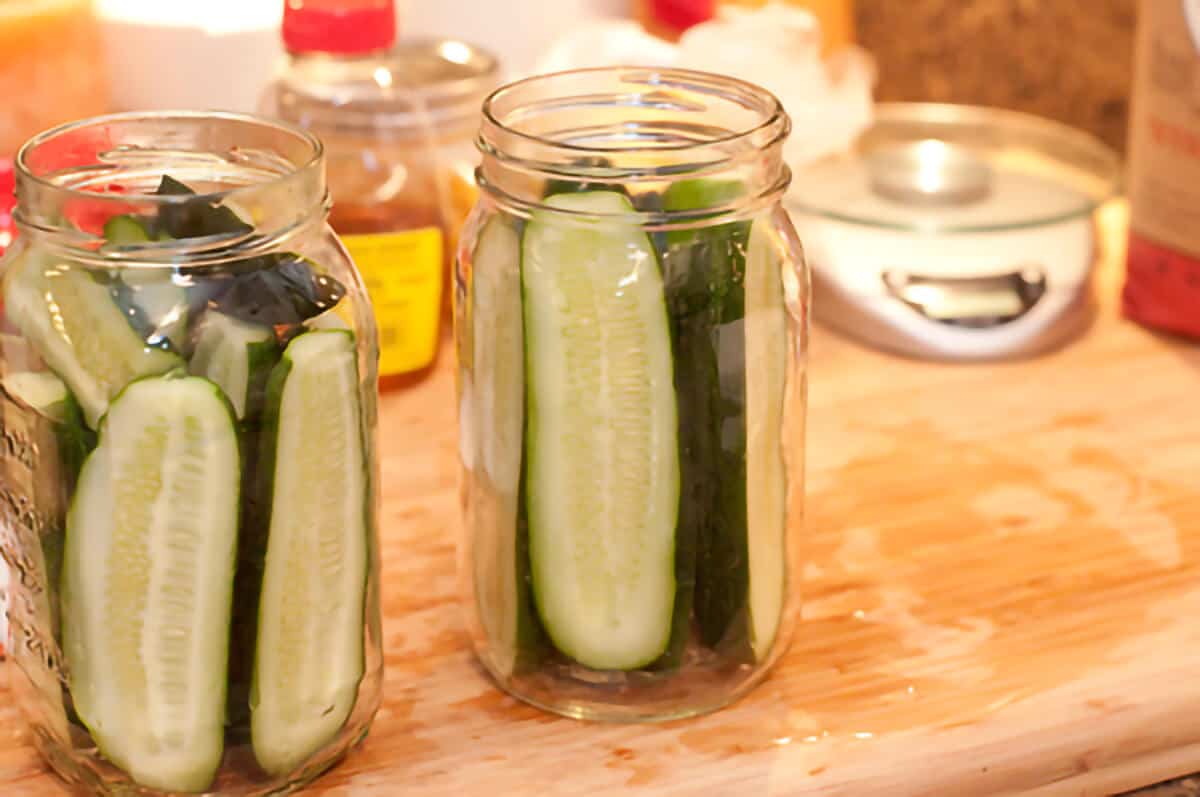
To each sterilized jar, add one head of fresh dill (if using) and pack with the cucumber halves or quarters. Pour the cooled mixture over the cucumbers in the jars.
Wipe the rims with a dampened paper towel. Add a canning lid and ring to each jar. Turn the ring just until you meet resistance. Don’t over tighten the rings.
Store the Pickles
Allow the jars to sit at room temperature for three days. Shake or turn the jars occasionally to distribute the seasonings. This short standing time allows for a very light fermentation process to take place.
After three days, transfer the jars to the refrigerator. May be stored unopened in the refrigerator for six months.
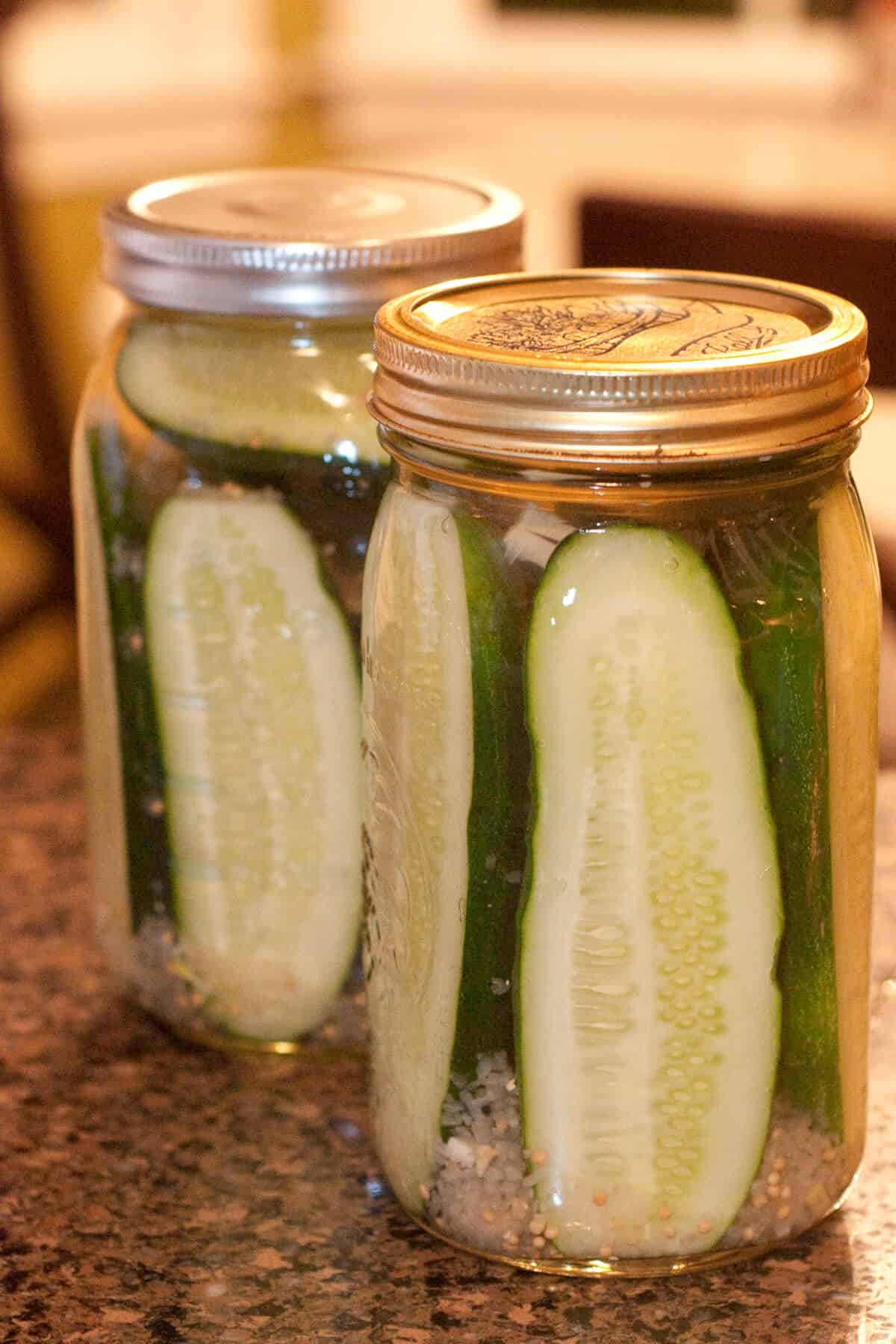
❗ Tips and Variations
- Be sure to use only pickling type cucumbers for the recipe (pickling cucumbers are also called “kirby” or sometimes “salad” cucumbers). Don’t purchase the typical waxed cucumbers found in the the produce section.
- Because this isn’t a canning recipe (i.e., it isn’t being prepared for pantry storage and it’s not shelf-stable), you can vary the ingredients a bit to suit your taste —
- if you like your pickles hot, add a dried red pepper pod to each jar along with the cucumbers.
- the amount of salt may be reduced.
- additional spices may be added; suggestions include dried coriander and/or dried red pepper flakes.
- Use pickling salt (no table salt or kosher salt) in order to prevent cloudiness of the brine.
- White vinegar may be used in place of cider vinegar. There will be a subtle difference in flavor.
❓ Questions About Copycat Claussen Kosher Dill Pickles
Without getting into the technicalities of Jewish dietary requirements, typically kosher dills contain garlic and peppercorns in the brine. Regular dills generally do not include them.
Pickles produced using this recipe must be stored in the refrigerator after the three-day standing time because they haven’t been processed to create a seal between the lid and the jar.
You can always grow your own. Or check your local farmers’ markets and grocery stores. I buy mine at the local Wal-Mart.
Yes, you can pickle many different kinds of vegetables! And they’re delicious, too. Try sliced carrots, cauliflower florets, celery, and sweet bell peppers.

Questions? I’m happy to help!
If you have more questions about the recipe, or if you’ve made it and would like to leave a comment, scroll down to leave your thoughts, questions, and/or rating!
Thanks so much for stopping by!
📖 Recipe
Want to save this recipe?
Enter your email below and get it sent straight to your inbox.
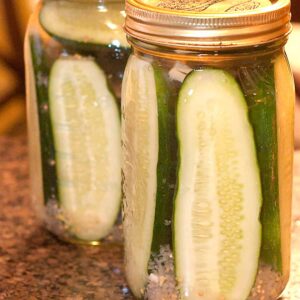
Refrigerator Kosher Dill Pickles
Ingredients
- 6 cups water
- 2 cups apple cider vinegar
- ⅓ cup dried minced onion
- 6 garlic cloves finely minced
- 1 ½ teaspoons yellow mustard seed
- ⅓ cup canning salt
- About 18 pickling cucumbers
- 6 heads fresh dill or 4 ½ teaspoons dried dill seed
Instructions
- In a large saucepan, bring the water, vinegar, onion, garlic, mustard seed, canning salt and dill seed (if using) to a rapid boil. Cook until the salt has completely dissolved. Set the mixture aside and allow to cool to room temperature.
- Prepare six wide-mouth quart canning jars and lids. Wash the jars, lids, and rings thoroughly in hot, soapy water. Rinse well. Keep the lids warm in barely simmering water until ready to fill the jars.
- To sterilize the jars, place the jars in a large pot and fill with water just to cover the jars. Bring to a boil. Boil 10 minutes. Remove the jars from the water using a canning jar lifter and place upside down on a kitchen towel to cool.
- Prepare the cucumbers by washing in cool water being careful to remove any dirt that may cling to the skin. Remove a 1/16” slice from the blossom end of each cucumber. Slice the cucumbers lengthwise into halves or quarters.
- To each sterilized jar, add one head of dill (if using) and pack with the cucumber halves or quarters.
- Pour the cooled mixture over the cucumbers in the jars. Wipe the rims with a dampened paper towel. Close the jars using two-piece canning lids but don't tighten the ring — turn it just until you meet resistance.
- Allow the jars to sit at room temperature for three days. Shake or turn the jars occasionally to distribute the seasonings. After three days, transfer the jars to the refrigerator. May be stored unopened in the refrigerator for six months.
- Makes 6 quarts.
Notes
- Be sure to purchase the right type of cucumbers for making pickles. You’ll want those labeled “kirby” or “salad” cucumbers.
- Store unopened in the refrigerator for up to six months. Once opened, use within six weeks.
Nutrition Information
Nutrition information is calculated by software based on the ingredients in each recipe. It is an estimate only and is provided for informational purposes. You should consult your healthcare provider or a registered dietitian if precise nutrition calculations are needed for health reasons.
— This post was originally published on August 3, 2013. It has been updated with additional information.

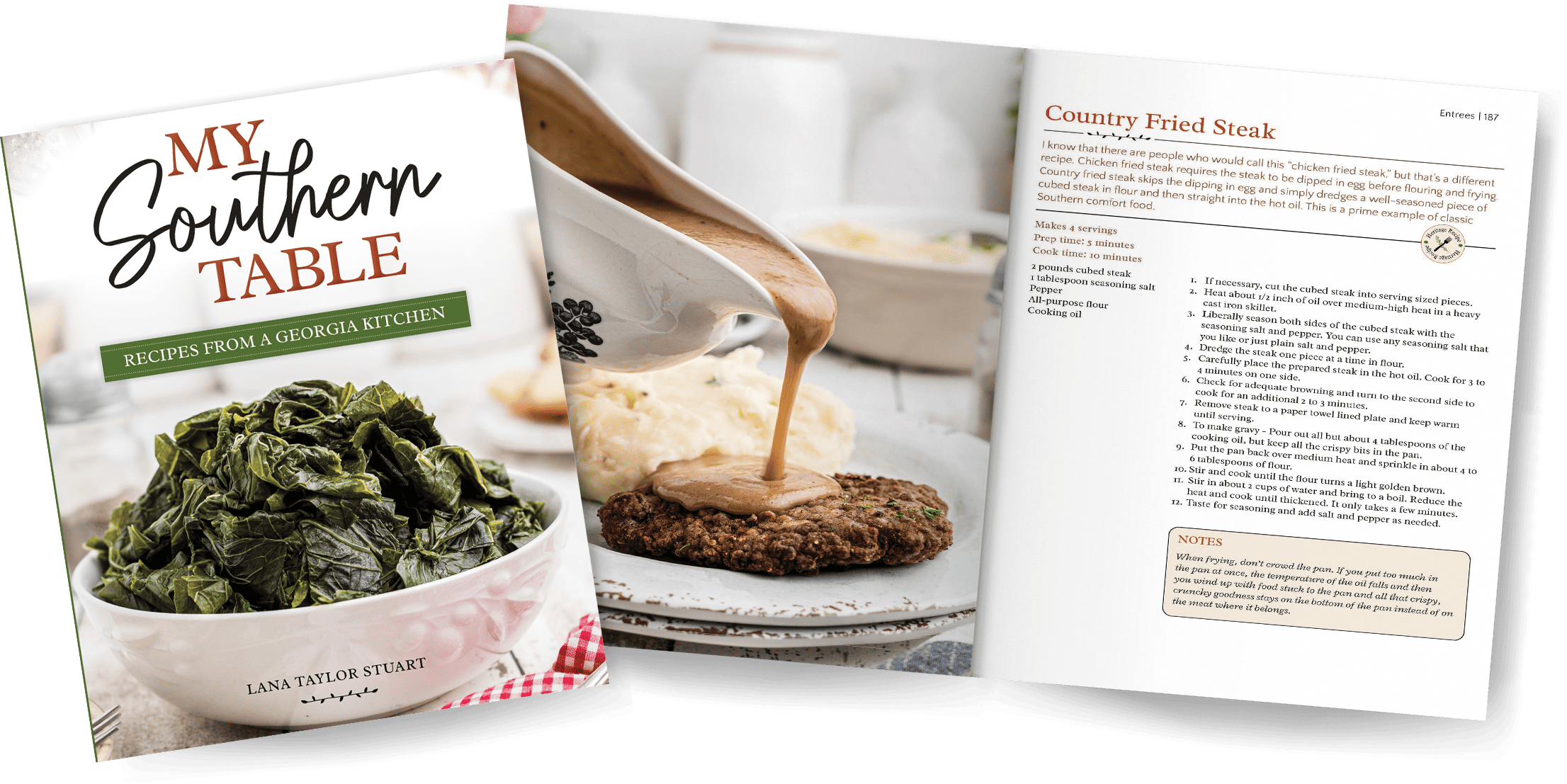
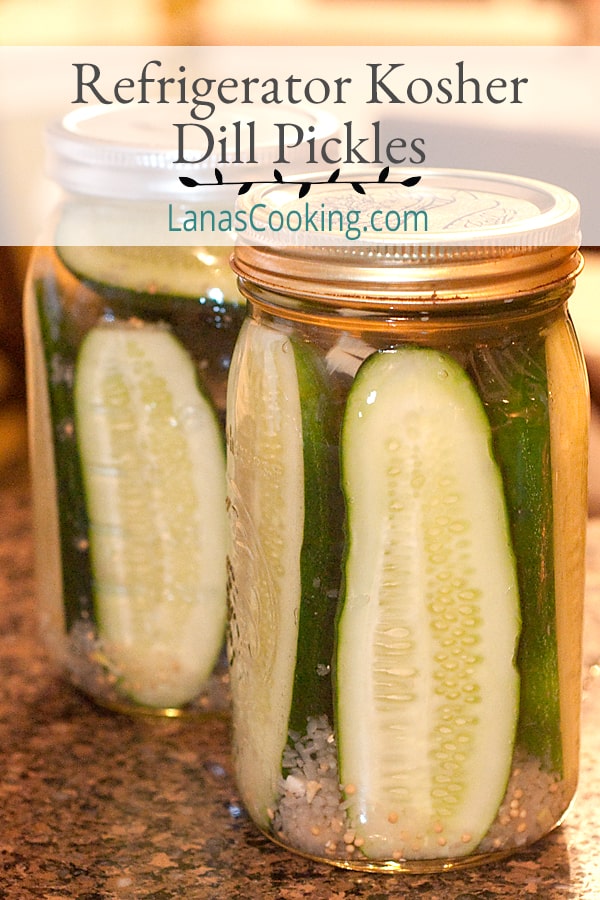
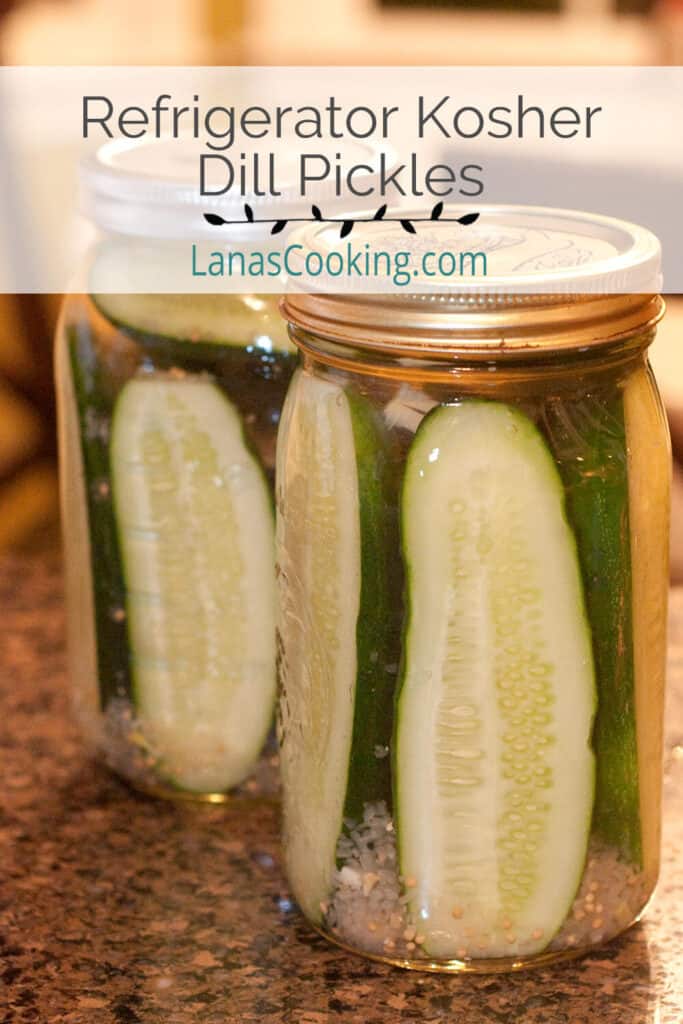
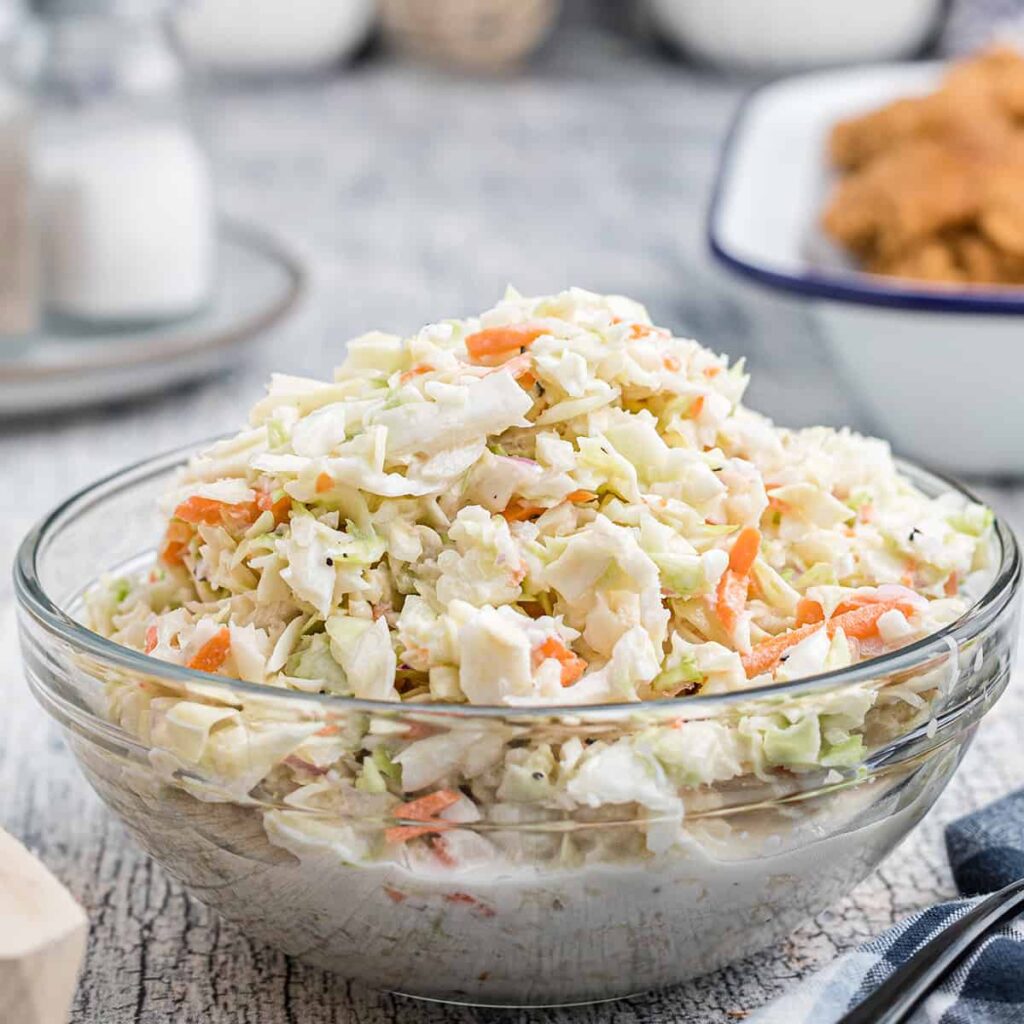
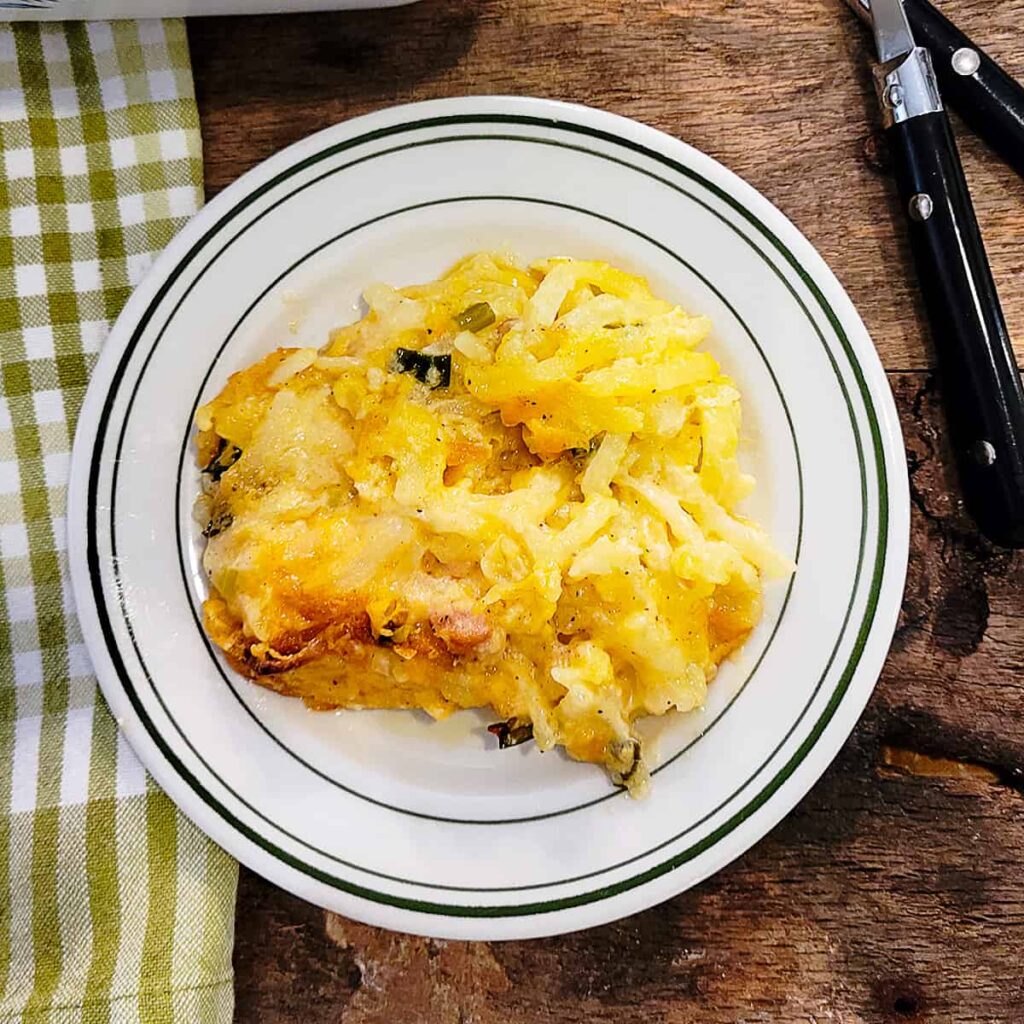

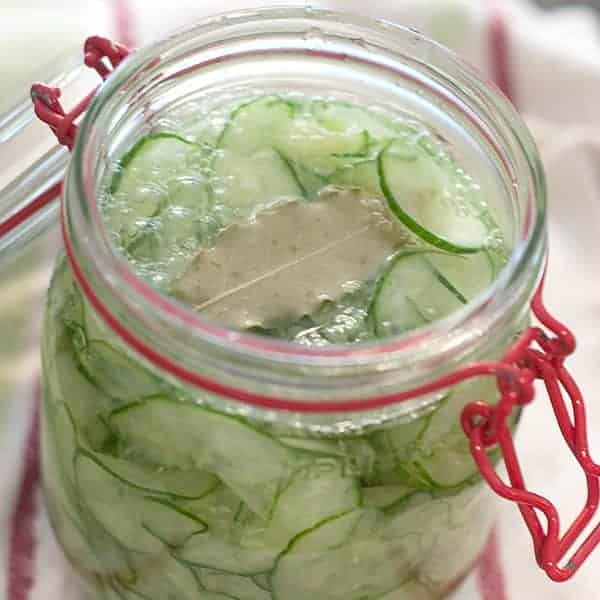
Thanks for a great recipe Lena. And your help along the way!
As I mentioned, I’m not in the USA so I made a few adjustments: a small onion (minced) instead of the dried onion (plus a teaspoon onion powder); an English cucumber (quartered) and Persian cucumbers (halved); a pinch of red pepper flakes and about 10 peppercorns.
Thanks again!
Hi Lena,
I’m an American living in Copenhagen and looking a a cool crunchy slice of home. We don’t have everything you mention readily available so I’m hoping you can help me with some alternatives
– can I use regular jars without a two piece lid? If not, what about weck jars?
– could you recommend fresh dill sprigs and if so, how much?
– would it be possible to use onion powder instead of dried onions?
Thanks for your help! Excited to try this recipe 😊
Hi Sean — Since this recipe isn’t processed for pantry storage and is kept refrigerated, the jars you use don’t matter much. Any glass container that can be thoroughly washed and sterilized will work. As to the ingredients, the recipe itself says “6 heads fresh dill or 4 ½ teaspoons dried dill seed.” I haven’t tried the recipe with a substitute for the dried onion, so I can’t give a recommendation there.
Thanks Lana. Appreciate the clarification. My understanding is a dill sprig and a dill head are different (head being the flowering part). Can I use a dill sprig?
Ok – there’s really no standard measurement for how much constitutes a “sprig” of dill. You’ll just need to use your best judgment as to how much to include. It’ll likely turn out fine 😊.
I’m saying sprig, but what I think I mean is the dill weed. Sorry about that! My confusion.
But I’ll try the dill weed.
We make a lot of recipes using just the pickle juice. Is this brine appropriate for that?
To be perfectly honest, I have no idea. This is not a commercial brine, and I’ve never tested it with other recipes.
Can I use fresh baby dill?
I assume you mean the fronds from very young dill? It will probably give a very mild dill flavor.
My pickles fizzed when I opened them. I’m worried they are not safe to eat. I did try one and it tasted good but the fizzing makes me nervous.
Hmmm. These pickles do go through a very light fermentation process so it could have been some of the fermented gases escaping. I’m not totally clear on what you mean by “fizzed.”
Is the type of cucumber important for flavor and texture or is it not safe to use the traditional wax cucumbers?
Yes, it’s important to use pickling type (or Kirby type) cucumbers. Other varieties will give unpredictable results; you may get softer pickles or a different flavor–some are more bitter, etc. Waxed cucumbers should not be used because the pickling solution cannot penetrate the wax coating.
My husband told me this is the one. He loves Clausens and told me not to bother making any other recipes. I am so glad because these are so easy!
Thank you!
The recipe was easy to make; the pickles are on day 2 of the fermenting process and looking good. Looking forward to trying them.
I hope they turn out great for you!
I made these a little over 24 hours ago and have had them at room temp but it looks like the cucumbers are growing mold??
Am I seeing it incorrectly or could I have done something wrong?
They looked so delicious and I was so looking forward to them!
I obviously can’t see what you’re seeing 😊. There are several things that can go wrong during a fermentation process to cause mold to grow. Here’s a good explanation — https://www.fermentedfoodlab.com/how-to-prevent-mold-when-fermenting-vegetables/. If you’re sure it’s mold, then they are not safe and should be discarded.
Can you use apple cider vinegar?
Yes, the recipe calls for cider vinegar.
Why do all of the Claussen copycat recipes use apple cider vinegar when Claussen uses distilled white vinegar. Completely different tastes.
So, make yours with distilled white vinegar.
Love this recipe I used coarse sea salt was very good can use more but I like sea saltiness. you called for pickling cucumbers. Which mine got very big!! And it worked. Will make this every year!!
Can I make the brine in advance & save it for later? If so, how should I store it & how long would it keep?
Sorry, I don’t have any information on that for you. I’ve never tried making and storing the brine in advance. I just make it as I need it.
I doubled the recipe for the brine. I added white vinegar instead of cider vinegar. I smashed all of the garlic cloves, it asked for them to be minced. I also added pickling spice from McCormick, about 2 tablespoons. I also added 2 tablespoons of sugar, to make the garlic and onion play nice together. I then tasted the brine, and it was sooooooooo mouthwateringly good! I can not wait to try these pickles.
So you made an entirely different recipe. Hope it turns out okay for you!
I made these pickles recently and was very pleased with how they tasted. These were made on the spur of the moment so I didn’t have the exact ingredients but they still tasted great! I used kosher salt instead of canning salt and because I didn’t have mustard seed, I used ground mustard. Can’t wait to make these with all the recommended ingredients.
I do hope you’ll try it again with the actual ingredients called for. Ground mustard and mustard seed are completely different ingredients and will produce totally different flavors.
I am growing cucumbers but they are growing slowly. So I want to try this but I only have 3 cucumbers 😥. Can I make this with just 3 cucumbers??
You might be able to make 1 jar with three cucumbers depending on their size.
Other similar recipes I’ve seen recommend not sealing the lids on the jar during the fermentation for gases to escape and also so you can scrape scum off the top. Just curious why you recommend sealing the jars and also if I should be sure to leave any space in the jar above the brine? Thanks!
The lids are not sealed. The instructions say to “Turn the ring just until you meet resistance. Don’t over tighten the rings.” That means don’t screw the bands down. Leaving this slightly loose allows the lid to move enough to expel gases as the light fermentation process happens. Because this is only a three-day light fermentation, I’ve never had any “scum” to form with these pickles. As far as headspace — headspace is only important when processing pickles in a canner. When you process there must be enough headspace and a loose enough lid that air can be expelled during the canning process in order create a seal. In this recipe, you’re not processing the jars nor are you trying to create a seal so the headspace doesn’t matter. You can fill the jars just to cover the cucumbers or all the way to the top — whatever suits you.
Just made this recipe and only ended up with enough brine for 4 jars. I followed the recipe to a T.
If you have brine leftover, you didn’t pack your jars with enough cucumbers.
We like sandwich slices. Do you think that would work with this recipe? Also, have you tried using Mrs. Wages extra crispy granules with this recipe?
Hi Virginia – I haven’t tried this recipe as slices, but I expect that it would work. I’ve never used any kind of crisping agents in my pickles.
Started making these for the first time this year. My family loves these pickles. Just finished making, I think my tenth batch.
Can you reuse the juice once you have ate all the pickles?
So, I’ve never tried re-using any pickle juice. However, if I was going to try it with this recipe, I would reheat the brine, let it cool, pour it over the fresh cucumbers, and let them sit for three days (just like in the recipe instructions).
Started making these last year and they are now our family’s favorite pickles! We have to have a whole separate fridge just for pickles! Thanks for an easy great recipe.
So glad you like the recipe!!
Do you have to let them sit on the counter or can you put them straight in the frig?
As I explained in the post, they have to sit at room temperature for three days to allow the fermentation process to occur. Do not refrigerate them until after they’ve been at room temperature for three days.
can you process they for shelf life
No, this is not a canning recipe.
Have you made this with White Distilled vinegar? If so does it alter the flavor dramatically?
It will change the flavor. It depends on what you consider to be a dramatic change, I suppose. Cider vinegar is more mellow with a slightly fruity taste; white vinegar is quite sharp and acidic.
I’m making them right now and I want to know how long they have to sit before you can eat them?
After the three-day light fermentation, move them to the refrigerator. Once they’re chilled thoroughly, they’re ready to eat.
Have you tried this recipe using sliced cucumbers?
No, I haven’t.
I am making these now with sliced cucumbers. should I still leave it to sit on the counter for 3 days?
Yes.
I’m excited to eat mine! I’m in the processes of making them now. I always do a little more vinegar and a little less water in all my pickling recipes, I also add a tad more salt and an extra garlic clove. So hoping I didn’t over do it 😆 Anyways how long do they need to sit in the fridge before the flavor has taken full effect and I can try them?
You can try them after they have finished their three-day light fermentation. I’d let them get really cold in the fridge first. Full flavor may not develop for about a week.
Thank you!
have you ever made these using zucchini?
No, I haven’t.
can you use pickling spices?
Mixed pickling spices will create an entirely different flavor.
I haven’t made these yet, although I eager to try this recipe. Twice in this post you say the pickles will last 6 months in the fridge, but in the notes at the end it says they last 6 weeks. I was wondering if you could clarify how long they are good for. Thank you.
Oh yes, I see the confusion now. What that note should say is “Store unopened in the refrigerator for up to six months. Once opened, use within six weeks.” I’ve corrected it in the post and thank you for pointing that out to me.
I recently made these pickles, (actually just before we left on vacation). I took one jar with me, and it was a big hit! However when I got home about 6 days after initially make them I realized I hadn’t refrigerated the pickles. The brine was slightly cloudy. Are they still edible?
I might add I was so mad at myself! 😩
I wouldn’t trust them if they haven’t been refrigerated for 6 days. I’m so sorry.
When you make this, do you not need to use the Ball Pickle Crisp? This is used to make sure the cucumbers are crunchy and not soft or soggy.
I don’t use “pickle crisp” in any of my canning recipes.
Can I prepare the vinegar solution and store the unused solution in the fridge to use later?
I’ve never tried that, but I see no reason that it wouldn’t work!
i LOVE LOVE LOVE the Cider Vinegar flavor!
Thanks for letting me know you like the recipe!
hey Lana,
thanks so much for sharing your recipe with us :)
I just finished making 4 nice big jars of these Kosher pickles. Can’t wait to try them and see how they turned out!
love from salt lake city
You’re welcome Aida. I hope you enjoy the pickles!
I have made these twice.. I opted for white vinegar and they are DELISH!!! I added jalapeños and Vidalia onions for extra yumminess!
If I use dried dill how much do I use
The recipe says 4 1/2 teaspoons dried dill seed.
How do I use this recipe for smaller amounts of pickles and I only want to pickle from my garden I don’t wanna buy large amounts of pickles I’m thinking like one jar at a time thank you Mike Boyd
The recipe is for making six quarts. So if you’d like to make one jar at a time, simply divide the ingredients by six.
Can I add a sport pepper from the garden to the jar to make them spicy?
Yes. Since this is not a canning recipe, you can make additions without worrying about food safety.
These are my favorite! I’ve tried many refrigerator pickle recipes trying to find one that tastes like a Claussen and this is it!
Thank you!
Curious though, do you strain off the ingredients and just use the brine?
Hi Jennifer – No, I don’t strain the brine.
Why do you let the brining solution cool? I thought the brine needed to be hot when poured into the jars and sealed?
For this recipe you allow the brine to cool in order to retain the crispness of the cucumbers. This is NOT a canning recipe. The jars are not water bathed for a heat seal and that’s why they’re stored in the refrigerator.
Oh interesting. I’ve been using the Mrs wages refrigerator mix, and following those directions, which have you poor the hot liquid into the jars and put the cap on and then store in the refrigerator once it cools. I always hear the top pop when it seals while cooling. I’m going to have to try your recipe and method and see how it compares!
The reason they have you store the jars in the refrigerator is because that is not a true seal. You may hear the top ping but that does not mean the jar is actually sealed. Canned foods have to be processed in a boiling water bath (or in a pressure canner for low acid foods) to actually create a seal. Just making the lid pop or ping doesn’t make a seal and is not safe to store outside of the refrigerator.
Could these be made into slices in pint jars?
Possibly. I’ve never tested that.
Why does it need to sit out at room temperature for 3 days? Wouldn’t it last longer in the fridge if it was put into the fridge right away?
As I stated in the post, the three day period at room temperature allows the pickles to go through a quick fermenting process to develop the flavors. They’re then stored in the refrigerator to both stop the fermentation and to lengthen storage. Three days at room temp doesn’t affect how long they can be successfully stored in the fridge.
I made these pickles yesterday and can’t wait to try! how long do I wait to eat after they are refrigerated?
You can eat them right away, but they’re best after about a month.
Thank you
Can I use this brine recipe in my canned dill pickles?
I would cook it like a pickle brine would be done.
I would can the pickles.
No. This recipe’s brine is not the proper level of acidity for canning.
Simple yet simply delicious!
I added 1/4 tsp pickle crisp.
Thank you for a recipe that can be used as my small crop of cucumbers are ready to pick!
You’re welcome!
I halved the recipe to three quarts. Does the liquid in the jar need to be to the top of the jar?
It needs to cover the cucumbers. Because this is not a canning recipe, the exact level isn’t important as long as everything in the jar is covered. If you didn’t have enough liquid, that typically means you didn’t pack your jars with enough cucumbers.
What kind of liquid would I need to add?
You would either add more cucumbers to fill up the jar or more of the pickling brine that you made with the recipe.
Can this recipe be cut in half to accommodate half the amount of cukes I have on hand?
Thanks!
Yes, of course.
I tried this recipe for the first time this year and we love it! My daughter can get enough. I would love to be able to keep them longer. Can I can them in a hot Water bath so I can store them on a shelf?
This recipe isn’t meant for canning. Refrigerator storage only.
This recipe is the best. Anyone who has tasted these pickles I made, beg for more! A forever keeper recipe
I made these the other day and I was amazed how much like Claussens they are. I didn’t have fresh dill so I substituted dried and I used fresh onion. Thank you !!
Thanks for letting me know that you enjoyed the recipe!
Is it apple cider vinager your refering to?? And what brand?
Yes, apple cider vinegar. I normally use the Heinz brand because it’s clarified (not raw) and won’t cloud the pickling brine like some others do.
How cooled do you let the mixture get until you add it to the cucumbers??? I’m guessing that is how you make them crispy. I always add the mix to the cucumbers while it is still boiling temperature and I’m guessing that’s why my pickles are always squishy. Thank you for the recipe. I have a lot of garden cucumbers and I’m going to definitely try this recipe.
Let it cool to room temperature.
Hi! I have tons of burpless cucs on the vine in the garden. I need to do something and would love to make these. Not the pickle cucs. Will I be ok to use mine?
Thanks!
I haven’t tested this recipe with other varieties of cucumbers.
I Just made my first batch but hardly have enough mixture for two jars what did I do wrong
Without being in your kitchen with you watching you make the recipe, all I can do is guess. But the most likely problem is that you simply did not pack enough cucumbers into the jars to take up the space.
How long do these need to be refrigerated before they are ready to eat
Hi Carol, the recipe calls for them to sit for three days at room temperature and then transfer to the refrigerator. They’re ready to eat at that point but I always give them at least 24 hours to chill for the best flavor.
I am making these tomorrow! Is it ok to throw some extra garlic (without putting it in the boiling brine) into some of the jars for us garlic lovers?
Sure, that’s fine. Just be sure to keep your pickles refrigerated.
I used regular vinegar instead of cider vinegar will they be safe to eat
As long as they’re kept refrigerated, yes, they’ll be safe. They will have a different taste because of the different vinegar used, but they’ll be safe.
Tried these a few days ago & my pickle loving family thinks they are great thanks! I did add a significant amount of minced garlic (about 4 T). I can’t imagine kosher dills without it.
Tried the recepie. Very easy. Let them set 3 days at room temperature, then 7 days in the fridge. I raised a quizzical eye brow at the 1/2 cup of salt. Boy oh boy! are they salty! What is the least amount of salt I can do without compromising the preservation factor? Otherwise, they were awesome! The crisp texture was amazing! I would also use fresh onion next batch.
Since there is no “preservation factor” with this recipe, you can reduce the salt to any level you wish. These pickles are for refrigerator storage only. They’re not shelf stable so you don’t have to worry about preservation.
Thanks! You’re awesome!
These are dill pickles, but what is kosher?
Kathy – you’ll see both regular dill pickles and kosher dill pickles on your grocery store shelves. In addition to the usual ingredients, kosher dill pickles have garlic and black peppercorns in the pickling liquid. The garlic and peppercorns may or may not be strained out before the pickles are packed into jars. I choose to leave them in.
making these NOW! in Sweden. Will let you know if they are SUPER…i am sure they are, as EVERYTHING I HAVE TRIED FROM YOUR PAGES ARE WONDERFUL!! You are a fine southern lady girl!! thank you for sending cooking ideas to a former Kentuckian whom lives in Sweden and other places in Europe for 40 years. HUG Michael
These looks so yummy, specially for my 8 years old daughter who loves pickles. Could I still seal them and keep them in the pantry or these are just for refrigerate them?
Hi Michaelle – these are really good pickles, but the recipe is not for pantry storage, refrigerator storage only. It hasn’t been tested for canning and, based on my experience, this brine would not be acidic enough to make a safe, shelf-stable product.
We made these yesterday and the tops never sealed. Are they supposed to or is that the reason for the refrigeration? If that’s the case, couldn’t you use old tops as long as they’re not bent? Either way, I’m sure my family will eat them before they go bad.
Hi Heather – they aren’t supposed to seal. You’d have to do a boiling water process on them to create a seal. That’s why they’re called “refrigerator” pickles. The jars and lids are sterilized to prevent any chance of contamination.
These remind me of my grandma’s pickles. So good. So crisp. Definitely giving these a try!
Thanks for the mention :)
You’re welcome! Your recipe sounds delicious, too.
I make a very good dill pickle that sounds somewhat the same but we call them solar pickles because we keep them outside in the sun for 3 days. They are topped with rye bread and then the lid is put on. No onions, just , dill, garlic, salt , vinegar and water! Very very good and just can’t make enough of them!
Now that’s something I’ve never heard of. Rye bread? Do you put it in the jar with the cucumbers, etc.? I’m intrigued.
I’ve never made kosher dills before, yours looks gorgeously perfect! Thank you for linking to my favorite quick pickle recipe of my mom’s, I need to make a batch!!
You’re welcome, Brenda. Your mom’s recipe sounds delicious and I’m planning on trying it next!
I wish I liked dill pickles. Never cultivated that taste, but these look wonderful.
Miss P
I didn’t know that you don’t like dill pickles! Oh well…more for the rest of us :-)
Love this! Never have made these before, but there’s a first time for everything, right? YAY! Thanks!
Hope you’ll give it a try, Kelly. Enjoy!
I am concerned about not using hot brine instead of the cold brine. Isn’t this risking bacteria? Shouldn’t they be put in the fridge immediatly?
Jane – I understand your concern. Refrigeration definitely slows down the growth of bacteria, but vinegar slows it even more. I felt that the amount of vinegar in the solution was sufficient to prevent problems. However, if you feel at all uncomfortable leaving the pickles out, by all means do refrigerate them immediately.
I’ve always wanted to make my own dill pickles. These ones look fabulous!
I hope you’ll try them, Sues! They’re really, really easy and so good.
oh yay! I am pinning this and trying it next week..so many cucumbers right now..thank you.
Love, Mona
Hope you enjoy it, Mona!